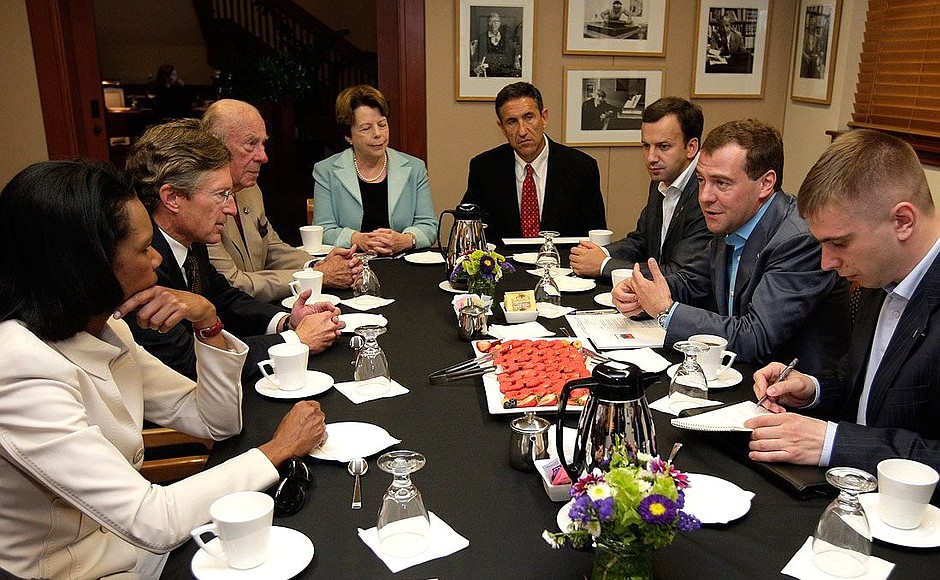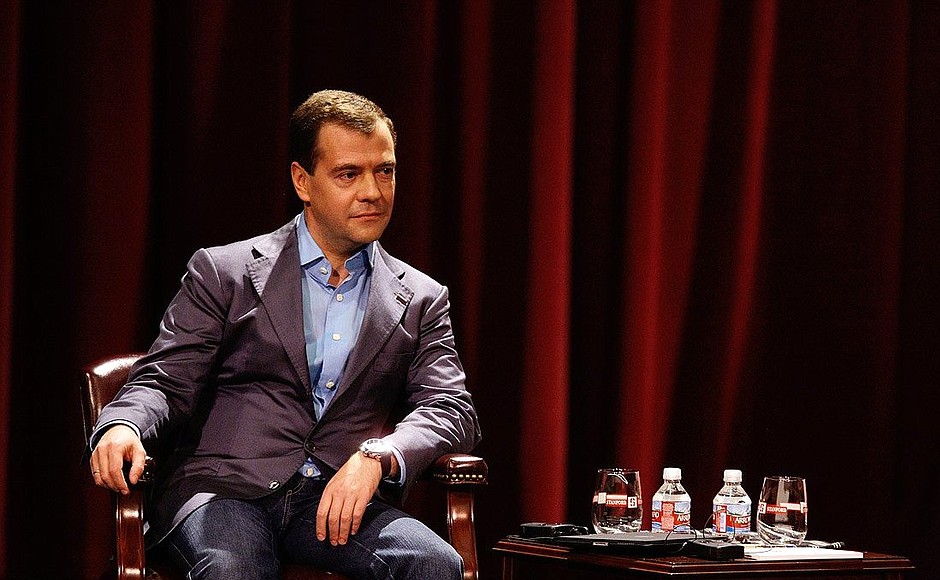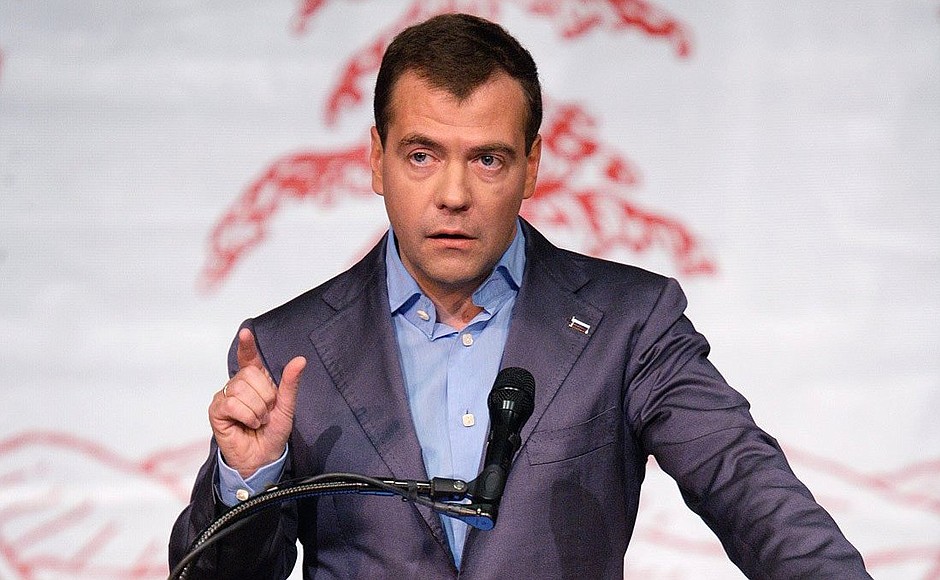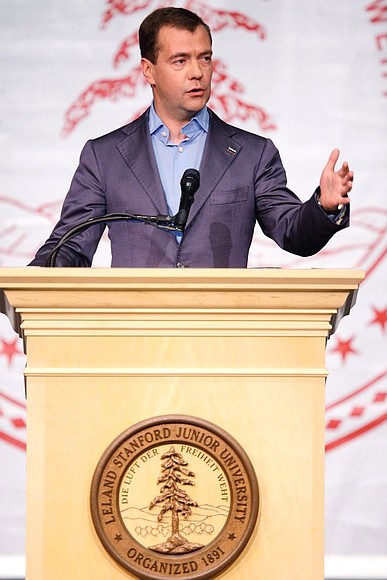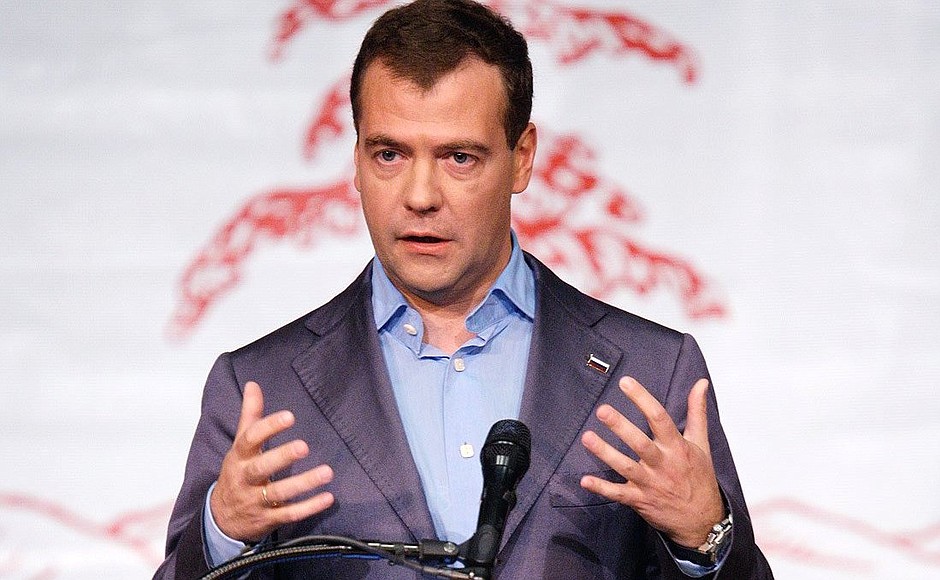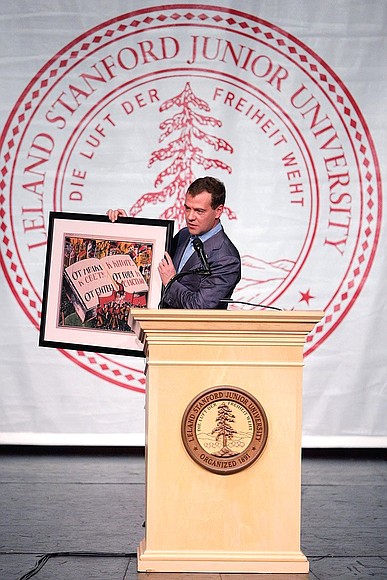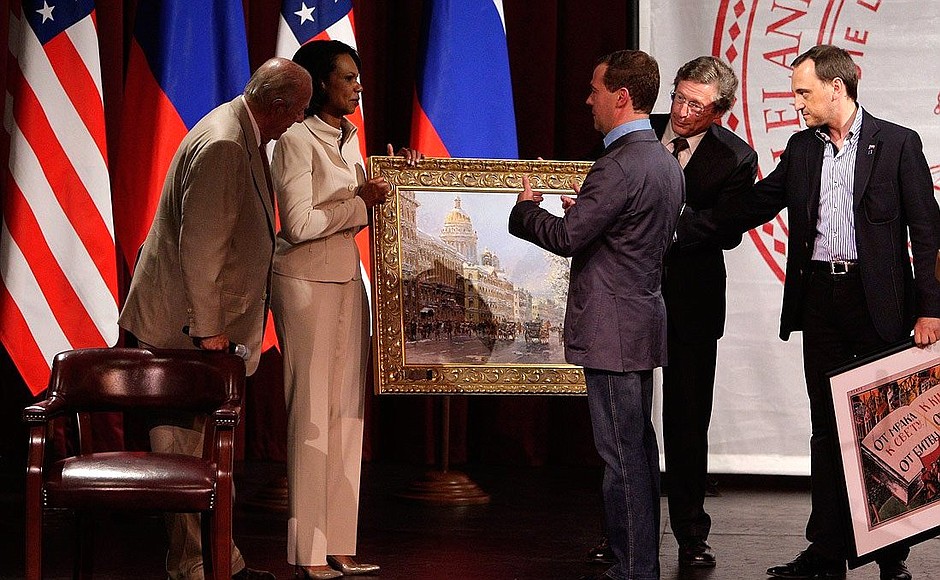In his opening remarks, the Russian President described the main challenges facing Russia.
Stanford University (Leland Stanford Junior University) is a private research university near Palo Alto, California, founded in 1891 by Senator Leland Stanford, a former governor of California.
In 2008, Stanford topped the list in the USA for money raised for education and research programmes – $785 million in all.
The university’s teaching staff includes 18 Nobel Prize winners and 135 members of the National Academy of Sciences.
Among Stanford’s graduates are the founders of Hewlett Packard, Cisco Systems, Google, and Sun Microsystems, as well as prominent American politicians and former US president, Herbert Hoover.
The university is home to the Hoover Institution on War, Revolution and Peace, the academic staff of which includes former US secretaries of state Condoleezza Rice and George Schultz.
Earlier President Medvedev met with the university's top officials.
* * *
President of Russia Dmitry Medvedev: I couldn't possibly read out my address at Stanford University from a hardcopy memo, so I am going to use modern communication technology.
Good afternoon, friends,
I would first of all like to greet all of you who have come to this meeting today, as well as everyone who studies, lives and works at Stanford and the surrounding area. I don't know if nature plays a special role here, although, as we have said earlier, the climate here is wonderful. Perhaps it is one of the key factors, but I think what is more important here is the opportunity to join creative efforts, entrepreneurial spirit and the speed of turning ideas into reality. I will not hide from you that everything I saw yesterday evening and today has been very impressive and inspiring. It has been fascinating to see not just the Californian landscape but also the enthusiasm that is shared here by people of different origins, people who came here from different countries, including Russia.
”We want our talented people, and Russia has always had a reputation for its talented people, to have every opportunity to fulfil their potential. In order to achieve that we need to reform our education system and create an opportunity for each talented individual to be reached by the people who support his or her ideas.“
I would also like to say that Stanford and Russia have a long history together. Hundreds of Russian students have participated in Stanford programmes in Russia, including through distance learning. By the way, the software that made those programmes possible was created by Demidov Yaroslavl State University in Russia.
I didn’t come here by accident. I wanted to see with my own eyes the origin of success, to see how innovative high-tech businesses are born.
Last week my home city, St Petersburg, hosted the International Economic Forum. I met there with representatives of the largest American companies, some of whom work here, in Silicon Valley.
The most important thing I heard them say is this: “We are ready to work in Russia, we want to act fast, so let’s do it together.” I’ll tell you honestly, I like this kind of approach.
One of the first Stanford graduates, thirty-first President of the United States Herbert Hoover once said: “Wisdom consists not so much in knowing what to do in the ultimate as in knowing what to do next.”
That’s why I’m not going to bore you with our detailed plans, but I would like to use this opportunity to share with you ten premises that I think are very important for Russia today.
First. We want our talented people, and Russia has always had a reputation for its talented people, to have every opportunity to fulfil their potential. In order to achieve that we need to reform our education system and create an opportunity for each talented individual to be reached by the people who support his or her ideas. That is very important and quite challenging. We have already begun our modernisation programme for schools and universities, and we award grants to young researchers and entrepreneurs. So far this may not be done to the extent that I would like, but I am confident that it will have a positive effect.
Second. I want all Russian citizens to have full access to information, in the broadest sense of the word. We are going to ensure that all Russians have digital HDTV in the next several years, while broadband internet will become available to 90% of the country. I think these objectives are very important. It will open access to all information channels in Russia and the rest of the world, which in the end will serve as an additional guarantee of the freedom of speech. Moreover, broadband internet will make a wide range of services available, without having to go through bureaucratic channels, which is always tiresome in any country, be it Russia or the United States. Modern technology will also help us fight corruption, which is another big problem in Russia. In order to realise that we must ensure the transparency of all procedures and cut down the government’s senseless interference in different affairs.
”It is vital, and I have stated this on many occasions, to educate people to respect the law and to ensure effective law enforcement, which includes competent courts and strict compliance with court rulings by everyone, the government, businesses and individuals.“
The third very important subject has to do with property rights. Russian legislation complies with modern standards already, but that is not enough to improve the situation. It is vital, and I have stated this on many occasions, to educate people to respect the law and to ensure effective law enforcement, which includes competent courts and strict compliance with court rulings by everyone, the government, businesses and individuals.
Fourth. Russia must become one of the leaders in innovative development. We will increase energy efficiency in all economic sectors in order to get the most from the natural resources Russia has in such abundance. The majority of new jobs will be in high-tech sectors and intellectual and other professional services. Economic growth will be driven for the most part by modernisation and introduction of innovations across the board.
Fifth. Russia needs a strong financial system, one that will have sufficient resources to back modernisation and provide businesses and individuals with everything they need. One advantage we have in this area is our revenues from the export of natural resources, rapidly growing stock market and retail banks, as well as the potential to make our national currency a reserve currency for our partners. The current financial crisis has shown how important it is to have a balanced currencies basket.
Sixth. Perhaps the most important task for Russia is the health of its people. We have already done and will continue to do a great deal to overcome demographic decline. The number of births has been continuously growing over the past five years, and the death rate has declined substantially. Last year the population decline stopped, which was a very happy event even though only recently demographic forecasts were very discouraging. Many countries are implementing healthcare reforms, including the United States, and not everyone sees them in a positive light, but without reforms we will not achieve success. In Russia, too we will reform our healthcare system.
Seventh. Russia is a young democracy. We have come a long way very quickly, which is a great achievement for a country like Russia. Our political system is constantly developing. Its foundation, which is defined by the Constitution, is in place and it guarantees every citizen's constitutional rights. At the same time, we are not immune from making mistakes and we are committed to improving our political system. But is it vital for us to do it on our own without external supervision. We are going to improve our party system, as well as other political and state institutions, including the judicial branch. I believe this is extremely important for Russia. My goal as President is to raise as far as possible the authority of the courts and to establish a truly effective judicial system that people believe in.
”The past 20 years were a difficult trial for Russia. That is why we value so highly the stability we have achieved in recent years. It is a vital factor in the country's modernisation and development. At the same time I am absolutely certain that the only kind of political system that can bring stability is one that is open to change.“
Eighth. Russia, like every other country, seeks stability, but for us it has a special meaning because the past 20 years were a difficult trial for Russia. It was a tough time for the Russian people. The market economy and democracy forced people to completely change their attitude to life. For many these years became a tough ordeal. That is why we value so highly the stability we have achieved in recent years. It is a vital factor in the country's modernisation and development. At the same time I am absolutely certain that the only kind of political system that can bring stability is one that is open to change.
One of the greatest challenges facing Russia today is the situation in the Caucasus. International terrorism is a problem for many countries; extremism in the North Caucasus is rooted in a most difficult social and economic situation. Young people in particular are affected by high unemployment levels, which reach 30–40% in some areas. The clan system and corruption are also factors that contribute to lack of stability. That is why it is our duty to deal with these problems as fast as possible. It is a prerequisite for future development.
Ninth. Russia will continue to do everything possible to remain a predictable international partner. Our foreign policy will be clear and consistent, for our own people first of all, given that the whole objective of foreign policy is to help a country reach its domestic objectives, but equally so for our responsible partners. It is important to be firm, and sometimes harsh, in protecting one's interests, but this should be combined with openness and readiness to find compromises with those who cooperate with us, on the basis of equality and respect for international law.
Tenth. Russia's foreign policy is future-oriented. We must find ways to tackle new challenges using modern technology. Resentment, including past grievances, is a path to isolation. Russia will remain a responsible participant in the global regulation system. This is an issue we are going to discuss at the G20 and G8 summits in Canada.
We are going to increase cooperation in the fight against terrorism, our joint efforts for a nuclear-free world, combating climate change together, and promoting energy and food security.
”Russia is committed to becoming an open country, open to cooperation with everyone who is interested in working with us, open to investments, to trade, to joint projects in any area of public life and, or course, in the economy.“
In conclusion I would like to say that Russia is committed to becoming an open country, open to cooperation with everyone who is interested in working with us, open to investments, to trade, to joint projects in any area of public life and, or course, in the economy.
I would like to invite everyone present here today to work with Russia: those colleagues I have met today, the people who believe in Russia's intellectual potential or those who, in fact, are part of that intellectual potential, those professionals who can share their knowledge with us and in return get new experience in a rapidly-growing county which, I hope, will be ready to respond to all modern challenges.
It is with that aim in mind that we have invited colleagues from the United States to join the management of the new innovation centre in Skolkovo, which is being built near Moscow and which is going to be Russia's answer to Silicon Valley. We have invited Craig Barrett, Roger Kornberg and other colleagues. And I would like to say that we are genuinely grateful to them for accepting our invitation.
Dear friends,
A prominent Russian writer Anton Chekhov once said that we must work, work and work because happiness is for our distant descendants. Chekhov is my favourite writer but I can agree only with the first part of this phrase. I believe that we will see the results of our joint efforts very soon. We want to become a country of new opportunities. If there are interesting ideas that can improve people's lives but have not been realised yet, we are ready to turn them into reality.
I see it as my goal to make people feel and believe that if they work hard and are ready to change the world around them, while acting within the law, they have every chance to succeed. That is our policy and that is my policy.
I would like to conclude with that and answer your questions. (Applause.)
Question: Igor Leonov, AmBAR executive committee. Mr President, what is your first impression of AmBAR and Russian Americans?
Dmitry Medvedev: My first impression was that they're Russians, just that they're Americans. (Laughter. Applause.) And, as they say, that explains a lot. I've just had a really good conversation with some of my compatriots, some of whom left Russia a long time ago, some only recently, some are American citizens and some are Russian citizens, and some are citizens of I don't know what. But it was great because it was an open discussion about ways to modernise Russia, to develop innovation economy and to address a backlog of major challenges. And what I really appreciated was that the people who talked with me proposed very practical solutions, which is probably typical of Stanford and Silicon Valley. It wasn't just abstract theorising, such as “You, the Government must do this and that and the other, and then, if we like it a lot, we may come back home for a couple of days.” I heard a really practical approach, a desire to work and to work together. And I truly count on that.
Question: Mr President, thank you very much for coming here to talk with us. It sounds like there is some plan for Russia, and it sounds like a good plan. You talked about the Russian healthcare system. I would like to ask about the plans to control the HIV epidemic, which is affecting Russia.
Dmitry Medvedev: We have to admit that this is a common threat. Frankly, it is not just a threat for Russia and not only for East European countries. It is a major problem. I think we have to tackle it in line with the programme of improving the healthcare system, which I mentioned in my speech.
When I was a member of the Government, we looked at fighting the threat of AIDS epidemic as one of the most important aspects of this work. As in the rest of the world, this kind of preventive approach must be based on certain perfectly obvious things. First of all, it should include education, and we all understand what kind of education that means. We mustn't be shy to talk about it openly. Every adult must realise what he or she must not do to avoid contracting HIV.
On the other hand, we must focus on medical treatments in line with the programme of improving the healthcare system, which we are implementing now. The entire humanity is fighting this menace at present. Unfortunately, there is no single perfect solution, although some countries have made considerable progress. But we haven't found a panacea yet, we don't have the vaccine that would paralise the HIV virus. I think we should concentrate our efforts on this issue and work together with other countries, including, of course, American medical professionals and biologists.
Question: Mr President, thank you very much for coming. I think it is very important that the first point on your programme is self-realisation. The problem here may be that often in Russia people rely on the state, hoping that the state will give them money, premises, different kinds of support, and so on. Here people's mentality is a bit different: we believe that people should live in such conditions that they would want to do everything themselves, to fish or to learn to fish themselves. Just a small point: we even have a saying about “crazy Russians” who get the most amazing start-ups going. That is, Russia really has a lot of talented people who can do it. But the question is how to create an environment where they will want to do it? It's like “Silicon Valley is not a territory, it's a state of mind.”
My question to you as President is how to make specific steps, not some global changes? I realise that Nobel Prize laureates and investments are all very important, but in the end it all comes down to people, and they have to be protected from officials, from criminals, from some obstacles on their way, and then things will get going. Could you please say if you have any concrete plans?
Dmitry Medvedev: Of course, there are plans, it couldn't be otherwise. You know, what's really important is that we don't get hung up on it. You said something very true in the beginning. People rely on the state too much in Russia. And self-realisation is a state of mind. If someone is ready for self-realisation, he or she will probably do it if there is will, character, and non-interference from the state. So we should get rid of paternalism. But we should do it very carefully considering that Russia, like any other country, is unique in its traditions and habits. For example, the things young people do may be unacceptable for older generations.
The state's task is to create a number of kickoff conditions. But that is very difficult. I agree with you, Nobel Prize laureates won't be enough to create them. I will say more, even money by itself won't be enough to create them. Money is great, nothing happens without it, but Russia has money now, even a lot of money in some cases, but we still don't have a Silicon Valley. So it's important to spend money well, to put it in the right hands. And finally, there must be the right rules for the way people work.
As I understand, your question is about the Skolkovo project we talked about today. You know, I don’t like exclusive arrangements because they can create an imbalance. Nevertheless, we have decided to create exclusive conditions for Skolkovo. That is why I submitted a special law on Skolkovo to the State Duma, our Parliament. This may become an unprecedented decision but we are going to introduce special tax rules for Skolkovo, as well as preferential treatment and special registration procedures, special oversight and even special jurisdiction regime. If all these rules are introduced, I am sure the project will succeed.
But in the end everything will depend on the people, on the government’s position and the position of the business. Finally, it will depend on your position: if you are ready to take part in the project, I am sure it will stand the best possible chance.
Question: Good afternoon, Mr President, and welcome to Stanford. My name is David Tsanava, I grew up in Georgia, but now I work at Stanford and I am a citizen of the United States. You said, in your point number eight, I think, that you have plans concerning the North Caucasus.
Dmitry Medvedev: Let me see what number it was.
Question: Do your plans include improving relations with Georgia? Or perhaps you have plans to end the occupation of Georgian territories? Thank you very much, and I wish you all the best.
Dmitry Medvedev: Thank you, David. Let me tell you openly about our plans. When I was talking about the programme for the Russian Federation, I meant the North Caucasus, of course, but I will be happy to answer your question about relations between Russia and Georgia. Regrettably, and this is my sincere position, our relations are dramatically poor at present. We believe that Russia was defending its citizens and its interests. This has led to unfortunate consequences.
But I would really like to see our ties with Georgia return to normal. What is more, I am absolutely certain that they will: after all, neighbours simply cannot go on quarrelling all the time. We lived side by side for centuries maintaining most sincere relations, and for a period we were part of the same country, which is also very important. The only question is when this is going to happen. I see no chance of it happening while the incumbent Georgian President is in office, because he has done a lot of damage, or to put it in legal terms, he has committed a crime. But his responsibility is to the Georgian people, not to the Russian people, although I have already told you my position.
I believe that as soon as Georgia has a new leader, we will have every opportunity to restore friendly relations. As for your question about the territories that have proclaimed independence, there are different approaches to this situation: some think that these territories are part of Georgia and must be returned to it. That is certainly a viable point of view. But there is a different position as well, which is that from the moment when these two territories were recognised they became sovereign states under international law. There are quite a few precedents like that in international law. That is the position of the Russian Federation.
Question: Good afternoon. Alex Iskandarian, local businessman. First of all, thank you for your businesslike approach, with no political sentiments. Here is my question. The problem, as I am sure you are aware, is that there is certain pessimism. And if we look realistically at the centre you want to build at Skolkovo, it is hard to believe in its success, even with the involvement of the business elite we see here. Have you thought about using the same format as in Korolev [research and production centre in the Moscow Region]? Because I think to bridge this gap you need transform Korolev into precisely this kind of place, a state within a state.
And another small question. You invite Russians to return to their home country. I wonder, are you inviting people like Kulibin [Ivan Kulibin, an outstanding 18th century Russian inventor] or are you more interested in businesspeople? There is a huge difference for us.
Dmitry Medvedev: Let me begin by answering your second question. I am inviting “business Kulibins” who are capable of tackling such challenges. We have set ourselves very difficult tasks that require a business approach, but the people cooperating on them will also have to be Kulibins, creative and talented people. As for your question about where we should realise our plans, you see, it all comes down to making a choice.
I had a choice of several options and took a long time to think it over. For example, should we aim to create a new high-tech centre in a new location, or should we do it somewhere where the infrastructure is already in place. In the end I decided to start from scratch, because this is a new project and we need to concentrate all our resources there, to invite competent managers and to attract businesses and our foreign partners. So I think a new location is an advantage. And if we succeed – and I sincerely hope that we will succeed – we can apply the Skolkovo experience in other places.
Finally, let me say a few words about pessimism. You know, I really don’t think that pessimism is a threat in this case because pessimism invariably accompanies various decisions adopted by the state. There was a time when nobody believed that man can travel into space, but he does and from different places. We did not believe it possible that information could travel great distances at such a speed, but it does. And I think the objective to create an innovation centre is something a country like Russia is undoubtedly capable of, but only if we communicate with people. Because in the end Skolkovo, like every other place of this kind, like Silicon Valley, for example, is first and foremost about people, it is all about brains and the state of mind, call it what you like, it is spirit of freedom, and that cannot be achieved by orders of decrees. That is perhaps the most difficult aspect of the task, but I am confident that we will resolve it.
Question: Good afternoon, Mr President. I am happy to see you here as we share the same home city and the same alma mater. I have a question connected to your speech, in which you outlined different directions for future development. I think all of that should be viewed in the context of your plans to run for a second presidential term or not. I would like to ask your opinion.
Dmitry Medvedev: That is always a major test for a politician. You know, it’s hard work being president. And the person who says at the start of his term in office “I am ready to work for two or three terms”, is generally a person who has either not realised what the job involves yet, or it is a person who is not quite ready for it. Let me tell you this: it really is a big test, but at the same time there is a sense of responsibility for completing the work you have started. If by the time this decision will have to be made the plans I have outlined today will come to fruition and if I have the support of the people, which is the most important thing for every politician to be successful and to have confidence that he can run for a second term, and if I still have the enthusiasm to continue this work, then I don’t rule it out.
Stanford President John Hennessy: Stanford is very lucky to have two former US Secretaries of State here today, and I would like to invite both of them here. Condoleezza Rice and George Schultz.
George Shultz: Mr President, thank you very much for your speech and your wonderful answers to the questions.
We thought hard about what kind of present to give you. We wanted to find something that would show Stanford University’s deep interest in Russia. So we looked through the Stanford archives and we found a poster that was very widespread in Russia in 1921. We had a copy of the poster in our archives. Here is that copy. You can read what it says here: “From darkness to light, from battles to books, from sorrow to happiness.” These are words for all ages. Thank you very much.
Dmitry Medvedev: There is something else Secretary Shultz has omitted to mention. There is writing here at the top in small letters. It says: “Workers of the world, unite.” (Laughter.) I am not a fan of that slogan, but I fully back what it says in big letters. (Applause.)
And here is a memento for Stanford. It is a view of St Petersburg. A lot of people who are present in this hall call it their home city. I am very fond of it, and I hope you love it too.
To conclude, I would like to say one final thing. You know, I am truly inspired by what I have seen here in Silicon Valley and at Stanford. There is a common Russian saying that it is better to see something once than to hear about it a hundred times. All of this is really impressive, even for a President. And in a way I am a little jealous, in a good way, of your opportunity to create, to teach, to earn money, to do what you love most and to fulfil your potential. That is real happiness.
I take my hat off to you. It has been a great pleasure. And I will work hard to deepen the ties between our countries and our universities.
Goodbye.
